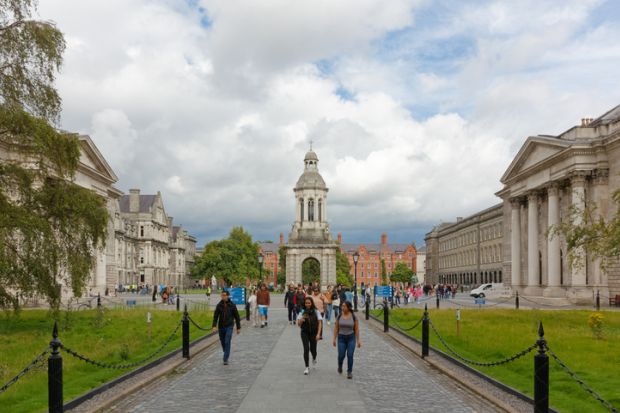Selection for the prestigious George J. Mitchell Scholarship will “pause” while the US-Ireland Alliance, which operates the programme, considers its “long-term sustainability” in the absence of a significant endowment.
The Mitchell Scholarship funds postgraduate study in the Republic of Ireland and Northern Ireland for up to 12 young Americans a year; it was founded in the wake of the 1998 Good Friday Agreement, in which US senator George Mitchell played a significant role. The programme will not select a class for the 2025-26 academic year, the US-Ireland Alliance said in a statement.
Funded in part by the Irish government, which has pledged to match any money raised up to €20 million (£17.1 million), the programme is “in no immediate financial difficulty,” the US-Ireland Alliance said, but lacks the sizeable endowment of similar awards such as the Rhodes Scholarship, which funds postgraduate study at the University of Oxford, or the Knight-Hennessy Scholars programme, which supports postgraduate study at Stanford University.
The alliance has estimated that a minimum endowment of $40 million (£31.3 million) would be necessary to ensure the scholarship’s future sustainability.
“It is time to pause to determine if there is sufficient interest in retaining the most prestigious scholarship that uniquely sends young Americans to the island of Ireland,” Trina Vargo, founder and president of the US-Ireland Alliance, said in a statement.
“The support we’ve enjoyed for the last 25 years is very much appreciated and necessary, but unfortunately it’s not sufficient. Hence the need for a bridge to the future, which an endowment will provide.”
Setting out in a question-and-answer document why the scholarship had not yet obtained an endowment, Ms Vargo responded: “Because I’m not a billionaire. And we simply haven’t found anyone with the money and/or the power to bring the money, who cares enough about the relationship to endow this.”
Ms Vargo has raised concerns about the Mitchell Scholarship’s financial viability in the past: in January 2023, the BBC reported that she wrote to US president Joe Biden as well as the Irish government to ask for their help in establishing long-term funding.
In 2014, the US Department of State cut almost half a million dollars in funding to the programme. At the time, Ms Vargo told Times Higher Education that the government department didn’t appear to “care about Europe any more”.
Register to continue
Why register?
- Registration is free and only takes a moment
- Once registered, you can read 3 articles a month
- Sign up for our newsletter
Subscribe
Or subscribe for unlimited access to:
- Unlimited access to news, views, insights & reviews
- Digital editions
- Digital access to THE’s university and college rankings analysis
Already registered or a current subscriber? Login








